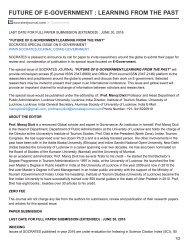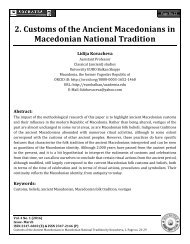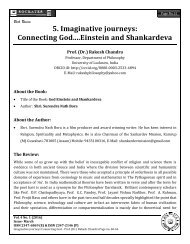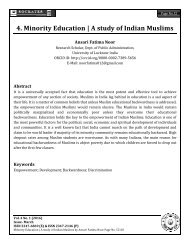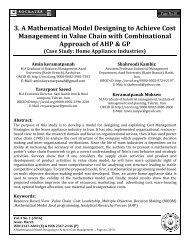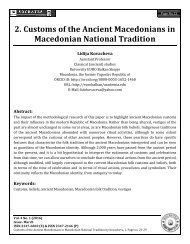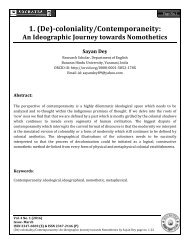(De)-coloniality/Contemporaneity: An Ideographic Journey towards Nomothetics.
Sayan, D. (2016). (De)-coloniality/Contemporaneity: An Ideographic Journey towards Nomothetics. S O C R A T E S, 4(1), 1-22. Retrieved from http://socratesjournal.com/index.php/socrates/article/view/199
Sayan, D. (2016). (De)-coloniality/Contemporaneity: An Ideographic Journey towards Nomothetics. S O C R A T E S, 4(1), 1-22. Retrieved from http://socratesjournal.com/index.php/socrates/article/view/199
Create successful ePaper yourself
Turn your PDF publications into a flip-book with our unique Google optimized e-Paper software.
Page No.20<br />
thrown out by a white man from the first-class train compartment at Pietermaritzburg on 7 th Jun,<br />
1893, he wrote an ‘Open Letter’ to the Natal Parliament on <strong>De</strong>cember 19, 1893:<br />
I venture to point out that both the English and the Indians spring from a common stock, called the Indo-<br />
Aryan…This believes serves as the basis of operations of those who are trying to unify the hearts of the two<br />
races…a general believe seems to prevail in the colony that the Indians are a little better, if at all than the<br />
savages or the Natives of Africa. The Indians were, and are, in no way inferior to their <strong>An</strong>glo-Saxon<br />
brethren, if I may venture to use the word, in the various departments of life – industrial, intellectual,<br />
political, etc…<br />
On what basis can the Indians be aligned to the ‘<strong>An</strong>glo-Saxon brethrens?’ Genetically or ideologically<br />
it doesn’t make any sense. But it is the same Gandhi who later on returns to India transforms himself<br />
from man of sophistication into a saintly figure. If the injection of the Euro-centric thoughts where<br />
the first form of totalitarianism, then the interjection tion of such anti-nationalistic thinking has lead to<br />
other forms of exploitations which continue to happen today under the canopy of different party<br />
manifestoes but the cause and result is the same. But it is the same who lead his life setting examples<br />
not only for the nation but also for the entire globe as well. In the Selected Writings of Mahatma<br />
Gandhi Ronald Duncan describes how the Gandhi inherited the divine ethics along with modern<br />
conformations <strong>towards</strong> framing a balanced nation, an ideal nation for all the developing countries.<br />
Though it didn’t happen, but the process of successfully initiated and proved to be highly influencing<br />
for the common mass. The rural folks who accounted to a major part India continuously failed to<br />
realize the necessity of hygiene in life and as a result despite several efforts they continued to relieve<br />
themselves in the open. Gandhiji never became agitated rather he himself cleaned their bowels by<br />
digging holes in the ground and burying them. After seeing their great leader doing such a humble<br />
job, they realized and joined him. This single instance can be epitomized how the basic mode of<br />
modern learning and education functions. This is the way how a society develops.<br />
Technology, more than its contributions have only reduced and narrowed the human faculty<br />
of explorations through the shadows of reality which it creates through multi-dimensional image and<br />
graphics. The common people cherish to explore the world with one click of their mouse or tapping<br />
of the screen, but have to rely on a truth, on a form of consciousness which is produced by the other.<br />
<strong>Contemporaneity</strong> have forcibly legitimized various ethos of human existence but failed to make it<br />
sensible and thus sensitize the people. Due to lack of sensitization people have failed to eternalize the<br />
basic optimistic standpoints for social development and changes. <strong>An</strong>d this process of eternalization is<br />
only possible when the individuals are once again given back their own socio-cultural and existential<br />
elements too which they belong. The concept of non-violence was not a Gandhian discovery but it<br />
was a simple effort on behalf of Gandhi to make the people realize to which cults and practices they<br />
Vol. 4 No. 1 (2016)<br />
Issue- March<br />
ISSN 2347-6869 (E) & ISSN 2347-2146 (P)<br />
(<strong>De</strong>)-<strong>coloniality</strong>/<strong>Contemporaneity</strong>: <strong>An</strong> <strong>Ideographic</strong> <strong>Journey</strong> <strong>towards</strong> <strong>Nomothetics</strong> by Sayan <strong>De</strong>y page no. 1-22




